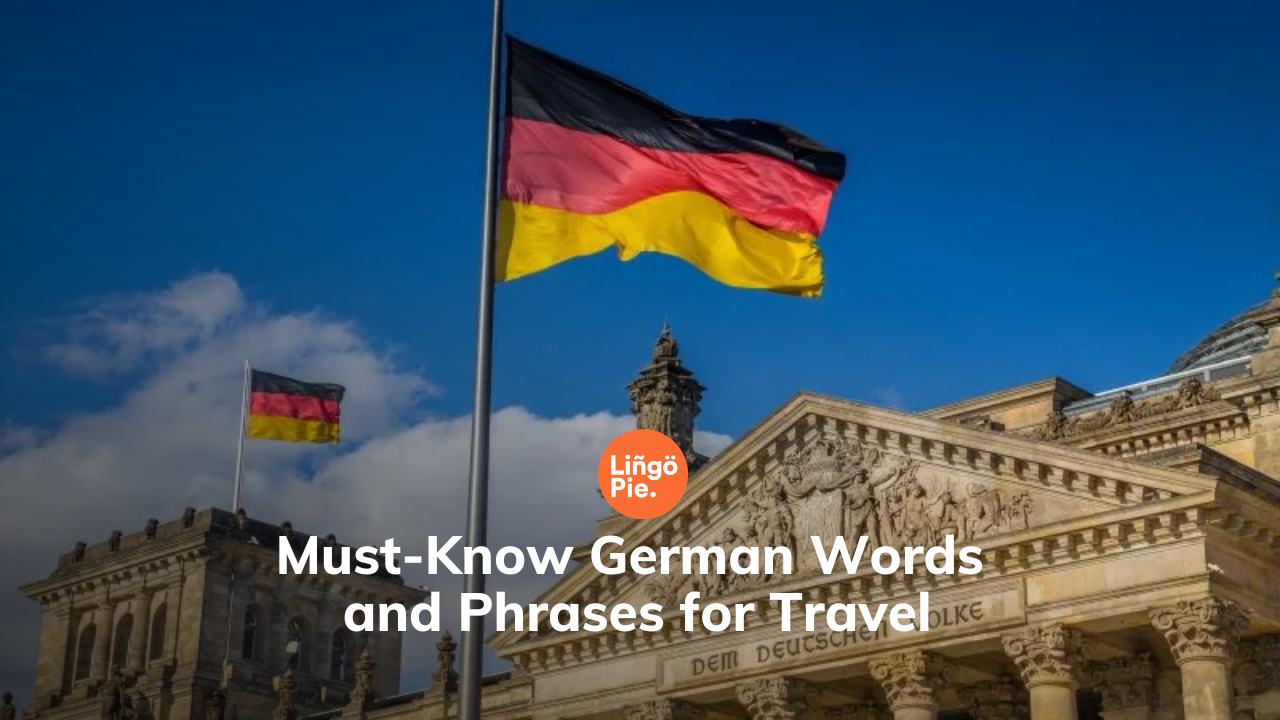If you are planning a trip to Germany, you will want to learn some basic German phrases and useful travel phrases before you go.
This will make it easier for you to greet people, ask for directions and order food, among other vital day-to-day activities.
Of course, many people in Germany will speak some English, but you cannot take this for granted. Moreover, it is nice to show willingness and learn some German as a sign of respect.
Now, before we dive into this quick guide to German travel phrases and everyday German phrases let’s introduce the German language.

The German Language
German is spoken by 95 million native speakers, predominantly around Western Europe. It is an Indo-European language and belongs to the West Germanic group of the Germanic languages.
Learning German is relatively straightforward for people who speak English. You can expect to speak German at an intermediate level after around six months if you dedicate yourself to your studies.
You can learn basic German words from language-learning apps like Duolingo. Beyond that, you should engage with German music and German TV shows and movies.
Listening to native German speakers will help you to develop your listening comprehension and vocabulary.
This is a style of immersive learning that is very popular in the language-learning community. Check out Lingopie for their large catalogue of native German content hand-picked for language learners.
The Very Basics
Before we delve into specific German travel phrases, let's go over the very basics. These are common German phrases for everyday use.
Danke (schön)
Starting with one you may already know, we have "thank you (very much)". You may already be familiar with the more common German phrases from movies and your previous travels. Danke schön is one of the most useful phrases you can learn, so write it down!
Bitte
Sticking with the theme of manners, we have "please". Even learning just "please" and "thank you" in German will take you a long way. People love to see that you have made the effort to be polite in their mother tongue.
Ja/ Nein
Another must-know pair of words is "yes" and"no" respectively. Both are very useful words and should be memorized before you begin to learn German travel phrases.
German Greetings
Now, we can move on to greetings in the German language. These basic German words will endear the locals to you and help you to make friends in Germany.
Guten Morgen
Beginning chronologically, we have "good morning". You can use "good morning" until midday to greet someone, just as you do when you speak English.
Guten Tag
For a more general greeting, you can use guten Tag, meaning "good day", between the morning and evening in Germany.
Guten Abend
In the evening, you will say guten Abend for "good evening". You can use "good evening" until you are ready to turn in for the night.
Gute Nacht
Then, before going to bed, you will say "good night". These phrases are used much in the same way as we use them in English.
Auf Wiedersehen
This is one of the German expressions many people know, thanks to the Sound of Music, but if you don't, Auf Wiedersehen means "goodbye".
Ich heiße…
To introduce yourself, you can say "my name is..."
Wie heißen Sie?
And ask your new friend in Germany "what is your name?"
Ich komme aus…
To introduce your home country or city, say ich komme aus…, meaning "I come from..."
Wie geht's?
Now for some more conversational German expressions. Wie geht's? is "how are you?"
Mir geht's gut
To which you can reply "I am good". Basic but easy for beginners.
Sprechen Sie Englisch?
This phrase means "do you speak English?"
It is written here in formal language which is customary when speaking to someone you do not know. But you can also ask sprichst du Englisch? if you are speaking to someone younger than you or someone you know well.
German Travel Phrases
Now, let's look at all the fundamentals in the German phrasebook relating to travel.
Entschuldigung
First, when traveling, it helps to know some basic German travel phrases regarding directions, important sites and emergency situations. All of these interactions will begin with Entschuldigung, meaning "excuse me".
Wo ist...?
This very helpful German travel phrase means "where is...?" and can be followed by any place name or item for which you are looking. The difficulty is that you will need to learn which articles go with which nouns (and in which German cases!)
Here are some examples:
- Wo ist die Toilette? - where is the toilet?
- Wo ist das Stadtzentrum? - Where is the city center?
- Wo ist der Supermarkt? - Where is the supermarket?
Wo finde ich…
You can also say wo finde ich..., which means "where will I find..." For example:
- Wo finde ich die Touristeninformation? - Where will I find the tourist information?
- Wo finde ich den Bahnhof ? - Where will I find the train station?
- Wo finde ich den Flughafen - Where will I find the airport?
- Wo finde ich die Bushaltestelle? - Where will I find the bus stop?
Wann fährt der nächste Bus?/ Wann fährt die nächste Bahn?
At the bus stop, you might need help reading the schedule, in which case you can ask "when is the next bus?"
Likewise, at the train station, if you do not understand the announcements or signs, you can ask a passerby "when is the next train?"
Ich bleibe für...
When discussing your stay with the hotel staff or friendly locals in a pub, you might want to tell them how long you are staying in town. For this, you say ich bleibe für..., meaning "I'm staying for..."
- Eine Nacht - One night
- Zwei Nächte - Two nights
- Drei Nächte - Three nights
- Das Wochenende - The weekend
- Ein paar Tage - A few days
- Eine Woche - A week
Wie viel kostet das?
When speaking German in a store, it is handy to know the phrase "how much does this cost?" This is one of the German basics that will get you far in a German-speaking country. Of course, you will need to understand the German numbers spoken back to you.
Ich verstehe nicht
When you cannot comprehend what someone is saying to you, you can always say "I don't understand". While this can be a frustrating feeling, it is worth remembering that you are on a learning journey and it is perfectly normal that sometimes you will not understand every word or situation perfectly.
Ich habe mich verlaufen
Just as you might struggle to comprehend all of the spoken German on your trip, you may also wander into unknown territory. If you find yourself unsure of your bearings, you can tell a stranger "I'm lost" and show them your hotel address so they can help.
Haben (as in ich habe, "I have") is one of the most common verbs in German so it is worth learning its conjugation and main uses.
Ich brauche einen Arzt
Of course, when you learn German travel phrases, the hope is that you will not need some of the phrases reserved for emergency situations. However, it is always worth knowing how to say "I need to see a doctor", just in case.
German Restaurant Phrases
Whether or not you have breakfast included in your hotel room, you will undoubtedly end up in a restaurant during your trip, at which point these phrases will come in useful.
Kann ich bitte die Speisekarte haben?
Use this phrase to ask "can I please have the menu?"
Was empfehlen Sie
If you are overwhelmed by the choice or not sure what it all means, simply ask the server "what do you recommend?"
Ich hätte gerne...
When you know what you want, say "I would like..."
- Ich hätte gerne die Bratwurst - I would like the sausage
- Ich hätte gerne die Kartoffelklösse - I would like the potato dumplings
- Ich hätte gerne den Apfelstrudel - I would like the apple strudel
Guten Appetit
Similar to the French bon appétit, guten Appetit means "enjoy your meal". Those who speak English do not have an exact translation, but we all know the French meaning.
Die Rechnung, bitte
At the end of the meal, you can ask for "the bill, please" - or simply use the universal sign for the bill if you do not want to use so many words!
Kann ich mit Kreditkarte / Bargeld bezahlen?
Finally, establish your payment method by asking "can I pay with credit card?" or "can I pay with cash?"
FAQs relating to essential German phrases for travelers
Now, let's look at some frequently asked questions relating to German travel phrases.
What is the best way to learn German?
The easiest way to learn German is to use a variety of resources and study a little every day. You will learn German easily with the help of German TV shows and movies, music, online German courses and language-learning apps that focus on German grammar and vocabulary.
What is a popular German saying for native German speakers?
There are a few popular and common phrases for natives. You might hear a native German speaker say Daumen drücken!, meaning "fingers crossed!" or in Teufels Küche sein
Wo finde ich den Bahnhof?, which is "to be in hot water" (literally "to be in the Devil's kitchen"). There are many funny words and phrases in the German language to explore as you learn.
Which countries speak German?
German is an official language in Austria, Belgium, Germany, Liechtenstein, Luxembourg and Switzerland. It is also spoken in parts of Italy and Poland. It is the most widely-spoken language in the European Union.

Summing Up: Must-Know German Words and Phrases
This has been a comprehensive guide to beginner German phrases for everyday life, introductions, travel and restaurants.
Now you are well-equipped with the language necessary for talking to taxi drivers, navigating souvenir shops and ordering food.
Traveling in a German-speaking country is much more fun when you know these things. Interesting things happen on vacation when you can talk with the locals!
So, start learning German today with Lingopie. This streaming site also offers high-quality content in 7 other languages.









